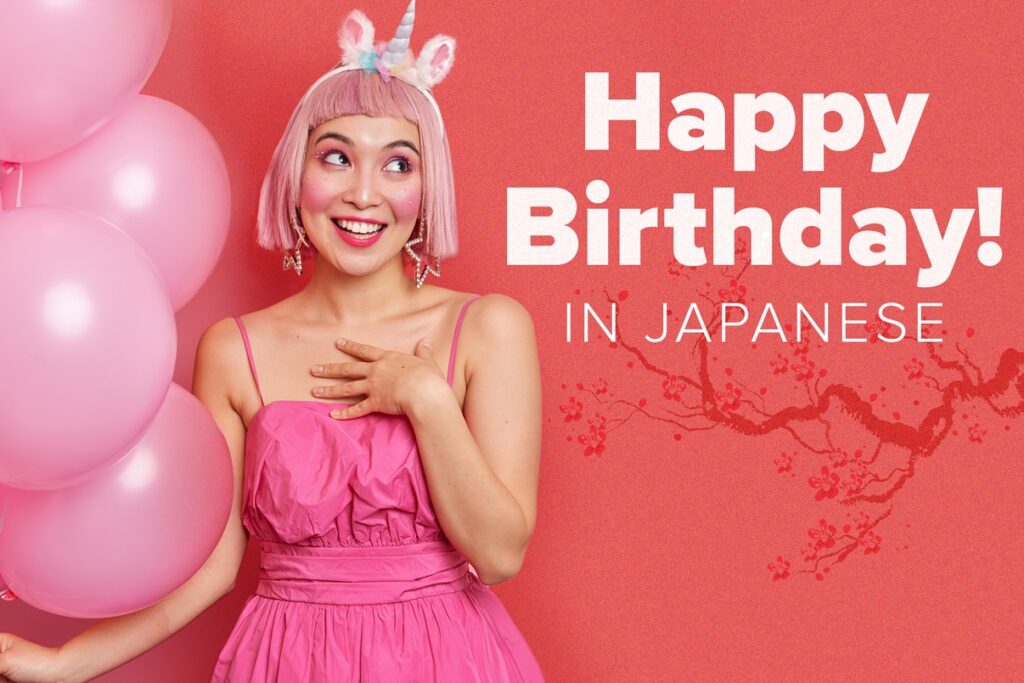Contents
- 1. Otanjoubi omedetou — Happy birthday (casual)
- 2. Otanjoubi omedetou gozaimasu — Happy birthday (formal)
- 3. Ota ome — Happy birthday (abbreviated slang)
- 4. 〇〇-sai no otanjoubi omedetou — Happy Xth birthday
- 5. Happii baasudee — Happy birthday
- 6. Osoku nattakedo, otanjoubi omedetou! — Happy belated birthday!
- 7. Suteki na ichinen ni narimasu youni — I hope this will be a wonderful year
- Must-know Birthday Vocabulary in Japanese
- Japanese Birthday Etiquette and Customs
7 Ways To Say “Happy Birthday” in Japanese Like a Native Speaker

Put on your party hat and go wish someone a happy birthday—in Japanese.
If you’re worried about how to share your well wishes, this post has got you covered. Learn seven ways to say “Happy Birthday” in Japanese, discover a few more important words and phrases for birthday wishes and learn some cultural tidbits that are a must for Japanese birthday celebrations.
Download: This blog post is available as a convenient and portable PDF that you can take anywhere. Click here to get a copy. (Download)
1. Otanjoubi omedetou — Happy birthday (casual)
Japanese: お誕生日おめでとう
(おたんじょうびおめでとう)
This is the most common, one-size-fits-all way to say “Happy Birthday” in Japanese.
If you’re a good friend or family member of the person turning a year older, you can save yourself a few syllables and leave off gozaimasu, or even the “o” in otanjoubi. This phrase implies a more casual, familiar vibe between the speaker and the listener.
Otanjoubi omedetou. Paatii o tanoshimi kudasai. — Happy birthday. Enjoy your party.
Japanese: お誕生日おめでとう。パーティーをお楽しみください。
(おたんじょうびおめでとう。ぱーてぃーおたのしみください。)
2. Otanjoubi omedetou gozaimasu — Happy birthday (formal)
Japanese: お誕生日おめでとうございます
(おたんじょうびおめでとうございます)
This phrase is the most polite way to give someone well wishes on their birthday. It’s a form of keigo, 敬語(けいご)— polite speech, a cornerstone of speaking the Japanese language.
This is a good option if you don’t know the person very well or if you want to show them respect.
Yamada-san, otanjoubi omedetou gosaimasu. Korekara mo Genki de ite kudasai. — Happy birthday, Mr. Yamada. Please continue to stay healthy.
Japanese: 山田さん、お誕生日おめでとうございます。これからも元気でいてください。
(やまださん、おたんじょうびおめでとうございます。これからもげんきでいてください。)
3. Ota ome — Happy birthday (abbreviated slang)
Japanese: おたおめ
You may have noticed that the more formal a phrase is, the longer it becomes as polite speech is added on to it.
The reverse is also true! Shortening otanjoubi omedetou, you get the super-snappy ota ome. This version of “happy birthday” is slang that’s used only in very casual settings, especially online, and is generally used more by the younger generation.
Ossu! Ota Ome! Nomi ni ikou. — Hey man! Happy birthday! Let’s go out for drinks.
Japanese: おっす!おたおめ! 飲みに行こう。
(おっす!おたおめ!のみにいこう。)
4. 〇〇-sai no otanjoubi omedetou — Happy Xth birthday
Japanese: 〇〇歳のお誕生日おめでとう。
(〇〇さいのおたんじょうびおめでとう。)
Is someone celebrating an important year? Or maybe you want to be more specific in your birthday wishes. In that case, use this phrase, which allows you to input the specific age someone is turning.
Note that although you’re technically counting in ordinal numbers (first, second, third… birthdays), you use the cardinal readings of Japanese numbers here (issai, nisai, sansai… no otanjoubi).
Jyuu hassai no o tanjoubi omedetou. Mou otona desu! — Happy 18th birthday. You’re an adult now!
Japanese: 18歳のお誕生日おめでとう。もう大人です!
(じゅうはっさいのおたんじょうびおめでとう。もうおとなです!)
5. Happii baasudee — Happy birthday
Japanese: ハッピーバースデー
(はっぴーばーすでー)
Given how loanwords are fairly common in the Japanese language, this one shouldn’t be much of a surprise! You can even mix and match and say, happii otanjoubi.
And, of course, the happy birthday song in Japanese might be easier to sing than you think!
Happii Baasudee tu yuu! — Happy birthday to you!
Japanese: ハッピーバースデー トゥーユー!
(はっぴーばーすでーとぅーゆー!)
6. Osoku nattakedo, otanjoubi omedetou! — Happy belated birthday!
Japanese: 遅くなったけど、お誕生日おめでとう!
(おそく なったけど、おたんじょうびおめでとう!)
If you missed your friend’s birthday, don’t sweat it! Just wish them a belated happy birthday in Japanese, just as you might in English. The key phrase here is Osoku nattakedo… (Though it’s late…) and you can follow it up with a birthday wish of whatever formality suits the occasion.
Osoku nattakedo, otanjoubi omedetou! Suimasen okuremashita. — Happy belated birthday! I’m sorry I’m late.
Japanese: 遅くなったけど、お誕生日おめでとう!すいません、遅れました。
(おそく なったけど、おたんじょうびおめでとう!すいません、おくれました。)
7. Suteki na ichinen ni narimasu youni — I hope this will be a wonderful year
Japanese: 素敵な一年になりますように
(すてきな いちねん に なります よう に)
Add this statement to your birthday wishes to make it even more heartfelt and meaningful. You can use this with anyone—it’s suitable for any level of formality, from your boss to your best friend!
Otanjoubi omedetou! Suteki na ichinen ni narimasu youni! — Happy birthday! I hope this will be a wonderful year!
Japanese: お誕生日おめでとう!素敵な一年になりますように!
(おたんじょうびおめでとう! すてきな いちねん に なります よう に!)
Must-know Birthday Vocabulary in Japanese
You now have seven different ways to say “Happy Birthday” in Japanese under your belt. Here are some essential words, phrases and sentences to know to keep the celebrations going:
- Tanjoubi
— Birthday
Japanese: 誕生日 (たんじょうび) - Tanjoubi Keeki
— Birthday cake
Japanese: 誕生日ケーキ (たんじょうびけーき) - Kanpai!
— Toasts!
Japanese: 乾杯! (かんぱい!) - Nansai desu ka?
— How old are you?
Japanese: 何歳ですか? (なんさいですか?) - Mada wakai desu ne
or Heewaka sou desu ne
— You look young for your age!
Japanese: まだ若いですね。(まだわかいですね。)or へー若そうですね。 (へーわかそうですね。) - Omedetou gozaimasu
— Congratulations
Japanese: おめでとうございます。 - Yatta!
— Yay!
Japanese: やった! - Sutekina tanjoubi o sugoshite kudasai
— Have a great birthday!
Japanese: 素敵なお誕生日を過ごしてください!(すてきなたんじょうびをすごしてください!) - Tsumawanai mono desu ga
— Just a little something for you
Japanese: つまらないものですが - Haaai! 〇〇-san no tameno puresento desu!
— Here you go! A present for 〇〇-san!
Japanese: は〜い!〇〇さんのためのプレゼントです!(は〜い!〇〇さんのためのぷれぜんとです!) - Otanjoubi no negai ga kanaimasu youni
— Here’s to your birthday wishes coming true!
Japanese: お誕生日の願いが叶いますように!(おたんじょうびのねがいがかないますように!) - Otanjoubi no yotei wa arimasu ka?
— Do you have any plans for your birthday?
Japanese: お誕生日予定はありますか?(おたんじょうびのよていはありますか?)
You can pick up even more Japanese birthday vocabulary by consuming authentic Japanese media. For example, this adorable and wholesome clip from the anime “Mayo Chiki” will warm your heart and teach you a few more phrases you could use with your friends.
You can find hundreds more authentic Japanese clips on the language learning program, FluentU.
It naturally and gradually eases you into learning Japanese language and culture. You’ll learn real Japanese as it’s spoken in real life.
Just take a look at the wide variety of authentic video content available in the program. Here’s a small sample:

You’ll discover tons of new Japanese vocabulary through these great clips.
Don’t worry about your skill level being an issue when it comes to understanding the language. FluentU makes native Japanese videos approachable through interactive transcripts.

Tap on any word to look it up instantly.
You’ll see definitions, in-context usage examples and helpful illustrations. Simply tap “add” to send interesting vocabulary words to your personal vocab list for later review.

FluentU even uses a learning program which adapts to your specific needs to turn every video into a language learning lesson and get you to actively practice your newly-learned language skills.

Start using the FluentU website on your computer or tablet or, better yet, download the FluentU app from the iTunes or Google Play store. Click here to take advantage of our current sale! (Expires at the end of this month.)
Japanese Birthday Etiquette and Customs
Just like in English, it can be a bit too straightforward to ask for someone’s age on their birthday.
But you can definitely ask about their birthday wishes!
Because of customs like this, it’s extremely important you understand basic cultural etiquette before attending a Japanese birthday party.
Don’t touch someone else’s gifts:
Here’s a word of advice: don’t touch or open someone else’s gift.
There’s a proper way to give gifts:
If you have a gift to offer the birthday person, you should give it to them properly.
In Japanese culture, you should always hand someone a gift with both hands and a slight bow. Don’t be surprised if the person rejects the gift once or twice, either. This is just a way of being humble and polite.
Just like how you gave the gift with both hands and a bow, eventually, your Japanese colleague or friend will also receive the gift with both hands and a slight bow.
Birthdays change as you get older:
As a child, your parents will throw a party for you. As you get older though, different people of importance in your life will start to take charge.
For example: In high school, if a young shounen 少年(しょうねん)(male) has a girlfriend, he’d be the one to take her out for her birthday.
And if you’re single, your friends are more likely to take you out or throw a birthday bash to honor you.
Special birthdays in Japanese culture:
In Japan, you’re considered an adult when you turn 18. (This was recently lowered from 20!) It’s also the age you can start to legally drink alcohol and are allowed to vote. So it only makes sense that someone’s 18th birthday is cause for a big celebration.
Your 16th birthday is also a big one, though. When a person turns 16, the five cycles of the Chinese zodiac are completed. The person is then considered “reborn.”
The last birthdays to be hyper-aware about are the 77th birthday, 88th and the 99th:
- The “happy age” is your 77th birthday
- The “rice age” is your 88th birthday
- The “white age” is your 99th birthday
And there you have it, your all-in-one guide for celebrating birthdays in Japan and using different, colorful expressions for saying “happy birthday” in Japanese!
So the next time you go to Japan, or when your Japanese language exchange partner’s special day approaches, pick from your new collection of phrases wisely.
And see your Japanese skills (and cultural understanding) skyrocket!
Download: This blog post is available as a convenient and portable PDF that you can take anywhere. Click here to get a copy. (Download)








